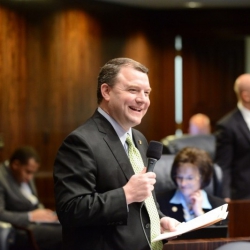
State Sen. Rob Bradley said the House version of the bill had “too many ornaments added to the tree.”
It appears that the $3 billion Florida gambling bill is dead for the time being. The bill failed to get out of a Senate committee this week. There is a chance it might be discussed on March 11, but if not, the Seminole gaming bill is unlikely to be passed before the session ends on March 20.
The deal was signed by Gov. Rick Scott and the Seminole Tribe in late 2015. The 20-year deal was supposed to give the state solid gaming revenues for the next 20 years, including $3 billion over the first 7 years. It was supposed to give the Seminoles a solid grasp over the banked games for the next couple of decades. Now that deal is in doubt.
House Committee Made Changes to Bill
On Monday, the House Finance & Tax Committee made a number of proposed changes to the bill while it was in the committee phase. On Tuesday, those changes proved to be too many and too fundamental for the State Senate’s leaders, so they tabled discussions on the issue for the time being.
Senate Committee Might Discuss on Thursday
A spokesman said there was a chance the Senate Appropriations Committee might reopen discussions on the bill on Thursday. If so, it would have to be on the initiative of Sen. Rob Bradley, who sponsored the bill in the Senate.
From an interview Sen. Bradley gave to the Miami Herald, it appears unlikely that is likely to happen. Bradley told the newspaper it is “very, very surprised if we saw any action on this issue this session.”
Sen. Rob Bradley Blames the House Changes
When asked to elaborate on why the bill was unlikely to get out of committee, Rob Bradley referred to the same alterations the Florida House of Representatives made to the bill that the Senate spokesman mentioned. He said too many add-ons had been included for the split legislature to approve the bill at this point.
In specific, he mentioned that one provision had added five new counties to the list of counties which might have slot machines. The limitation of slots is one of the key provisions, because many lawmakers (and the Seminole) consider expanded gambling to be a non-starter.
List of the Changes
The bill also allows horseracing tracks with slots and card rooms to cancel their live racing operations, thus making the transition from racetrack to a pure casino operation. The racino provisions was presented to lawmakers and voters alike as a way to keep the racetracks in business and protect the horse trainers industry, but such closures would do no such thing. Only the racetrack’s site owners and casino workers would benefit from such a law.
The House also required voter referendums on any future gaming expansion in the future, a move which would bind the hands of politicians in the future. Rob Bradley considers such a provision to be unacceptable.
In his remarks to the Miami Herald, Sen. Bradley described the House’s version of the bill as “too many ornaments added to the tree.”
No Deal for 2016
If Sen. Bradley does not revive the bill on Thursday, it appears it will be 2017 before Rick Scott’s deal with the Seminoles can be approved. Meanwhile, the Seminoles continue to pay about $100 million a month in taxes on the old 5-year bill, which was signed in 2010.
One provision of the 2010 bill was a monopoly on banked games like blackjack, roulette, and craps. That provision ended in June 2015 and has been a source of contention ever since. The Seminoles claim the state has allowed other sites to have banked games by allowing video blackjack and video roulette at those sites. The state argues other states do not classify such gaming with the traditional hand-dealt games as “banked” — meaning the casino puts up the money against the gamblers.
Seminoles’ Lawsuit
The dispute is the subject of an ongoing lawsuit between the State of Florida and the Seminole Tribe. Prior to the agreement signed by Gov. Scott and the Seminoles late last year, the Seminoles had threatened to stop paying taxes on its casino gaming, citing a clause in the 2010 contract which would allow them to do so. Instead of going for the nuclear option, the Seminoles decided to file a lawsuit to gain clarification.
Under the new proposed deal, the Seminole tribe would receive the sole right to have games like craps and roulette, while giving limited rights to slot machines to casinos in two South Florida counties. In exchange, the state would receive a guaranteed $3 billion in the first 7 years of the compact.
